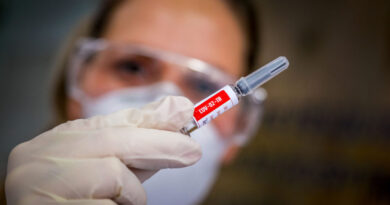Covid: ‘Broken’ doctor speaks out against conspiracies
 Image copyright This is what broken looks like by Ceri Hayles
Image copyright This is what broken looks like by Ceri Hayles A junior doctor has spoken out at coronavirus conspiracy theories after being accused of faking a photograph following an operation in full PPE.
Ceri Hayles took the picture after a surgery at the Princess of Wales Hospital in Bridgend, her face showing the indentations of a mask and a visor.
She sent it to the National Portrait Gallery and it has been included in its Hold Still digital exhibition.
She said it was “worrying” some people believed she had faked it.
Dr Hayles, an obstetrics and gynaecology doctor who now works at the Royal Gwent Hospital in Newport, said the picture was “what broken looks like”.
“I think it was just pure exhaustion and coming out of that operation, it was particularly difficult,” she said.
“You catch sight of yourself in the mirrors you have to use while you’re taking all of your PPE off to make sure you’re doing it properly, and I saw myself and thought you could really see how tired I was so I took the photo to send to my family.
“I thought it accurately summed up what so many of my colleagues were experiencing on a day-to-day basis and now seeing it in that gallery alongside such other powerful images is quite a strange experience.”
‘It’s terrifying’
Dr Hayles spoke of her concerns with coronavirus cases now rising again – especially having seen some of the comments on the photograph which deny the virus exists and accuse her of faking the picture.
“It was probably the hardest day that I had during the first wave and looking back at it now, it’s quite strange to see that picture and think we might be approaching something similar again soon, it’s quite worrying.
“There are so many wonderful comments from people I’ve never met through to patients who said ‘you looked after me recently, thank you for everything you’ve done’.
“A few people said things along the lines of ‘it’s obviously a faked photo she’s been paid for’, it’s mad that people would think like that.
“I feel sorry for people who haven’t seen what we’ve seen and therefore think the only way those images are made is through lights and cameras and make-up, because it’s very real situation so many of us find themselves in at work, and to have people question your integrity on a very public scale is quite difficult to deal with.
“And also you think if they don’t believe what’s happening, how are they ever going to take any of these measures seriously to prevent us from being back there again?”
Dr Hayles said a second wave was “not a welcome prospect”, especially as doctors are currently able to treat less urgent conditions again.
“I think without being too dramatic it’s terrifying to think we might be going back to how things were six months ago, the stress levels everyone endured and would endure again.
“We’ll all do the same things, we’ll all put ourselves through the same things again but it’s not a welcome prospect, things have reached some semblance of normality, we’re starting to be able to see patients who have been waiting months and months and months for their slightly more elective work to be done.
“It’s sad to think we might have to stop doing that and see so many more patients that are suffering with covid and the difficulty that brings in providing safe care for them.”
PPE means more risk to patients
Dr Hayles said there were also risks involved with working in the level of PPE that was necessary during the first wave of coronavirus.
“We were working a lot more hours in a lot more stressful conditions, we were struggling to provide the care that we wanted to.
“You have to put all this kit on before you can see anyone and in the environment I work in, every second is critical, so pausing outside the door for 30 seconds to put all of your kit on and make sure you’re safe to go in can impact the outcome for them.
“None of us want to be doing that more and more and more.”
The Hold Still digital exhibition is available to view online at www.npg.org.uk/holdstill
*** This article has been archived for your research. The original version from BBC News can be found here ***


